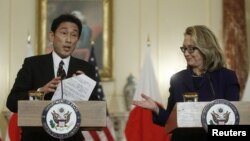STATE DEPARTMENT —
The United States is urging new leaders in China and Japan to find a peaceful way to settle their long-standing territorial dispute over islands in the East China Sea. U.S. Secretary of State Hillary Clinton met Friday with Japanese Foreign Minister Fumio Kishida to discuss the standoff.
The election of Japanese Prime Minister Shinzo Abe has added to growing tensions over the contested islands with his plans to increase overall Japanese defense spending.
Kishida said the Abe administration considers China one of its most important bilateral relationships and intends to promote a broad, mutually-beneficial relationship based on common strategic interests.
"While Japan will not concede and will uphold our fundamental position that the Senkaku Islands are an inherent territory of Japan, we intend to respond calmly so as not to provoke China," he said through an interpreter following talks with Secretary Clinton.
The islands called the Senkakus in Japan are known as the Diaoyus in China.
The long-standing dispute grew more serious in 2010 when Chinese fishermen rammed two Japanese coast guard vessels. Beijing and Tokyo now conduct rival aerial surveillance over the disputed waters, adding to U.S. concerns of more serious confrontation.
Clinton said Washington is working to preserve the status quo until there is a more constructive dialogue.
"Although the United States does not take a position on the ultimate sovereignty of the islands, we acknowledge they are under the administration of Japan," said Clinton. "And we oppose any unilateral actions that would seek to undermine Japanese administration. And we urge all parties to take steps to prevent incidents and manage disagreements through peaceful means."
She said the Obama administration is hopeful that Tokyo and Beijing can lower tensions and prevent an escalation of the standoff that would permit them to discuss a range of other important issues.
"We applaud the early steps taken by Prime Minister Abe's government to reach out and begin discussions. We want to see the new leaders - both in Japan and China - get off to a good start with each other in the interest of the security of the entire region," said Clinton.
In addition to the island dispute with Japan, China also has territorial standoffs with Vietnam, Malaysia, the Philippines, and Brunei over the South China Sea.
The election of Japanese Prime Minister Shinzo Abe has added to growing tensions over the contested islands with his plans to increase overall Japanese defense spending.
Kishida said the Abe administration considers China one of its most important bilateral relationships and intends to promote a broad, mutually-beneficial relationship based on common strategic interests.
"While Japan will not concede and will uphold our fundamental position that the Senkaku Islands are an inherent territory of Japan, we intend to respond calmly so as not to provoke China," he said through an interpreter following talks with Secretary Clinton.
The islands called the Senkakus in Japan are known as the Diaoyus in China.
The long-standing dispute grew more serious in 2010 when Chinese fishermen rammed two Japanese coast guard vessels. Beijing and Tokyo now conduct rival aerial surveillance over the disputed waters, adding to U.S. concerns of more serious confrontation.
Clinton said Washington is working to preserve the status quo until there is a more constructive dialogue.
"Although the United States does not take a position on the ultimate sovereignty of the islands, we acknowledge they are under the administration of Japan," said Clinton. "And we oppose any unilateral actions that would seek to undermine Japanese administration. And we urge all parties to take steps to prevent incidents and manage disagreements through peaceful means."
She said the Obama administration is hopeful that Tokyo and Beijing can lower tensions and prevent an escalation of the standoff that would permit them to discuss a range of other important issues.
"We applaud the early steps taken by Prime Minister Abe's government to reach out and begin discussions. We want to see the new leaders - both in Japan and China - get off to a good start with each other in the interest of the security of the entire region," said Clinton.
In addition to the island dispute with Japan, China also has territorial standoffs with Vietnam, Malaysia, the Philippines, and Brunei over the South China Sea.
